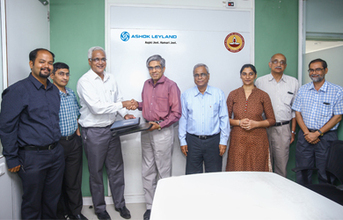
Ashok Leyland and Indian Institute of Technology Madras (IIT Madras) signed a Memorandum of Understanding (MOU, for Ashok Leyland to sponsor the Centre of Battery Engineering (CoBE) at IIT Madras.
The CoBE will seek to supplement the on-going research by facilitating collaboration between industry and researchers, which is currently lacking, to study various battery characteristics that are not completely understood even among Global players.
Commenting on this landmark initiative, Karthick Athmanathan, Head, Electric Vehicles and e-Mobility Solutions, at Ashok Leyland, said, "Ashok Leyland has been leading in pioneering technologies and disruptions in the commercial vehicle space. Everything that we do and strive to achieve is linked to our philosophy, ‘Aapki Jeet, Hamari Jeet'.
"Whether it was meeting the BS-III norms with a mechanical fuel pump or being the first OEM to introduce an all-electric bus, Circuit, or the latest innovation, iEGR technology for BS-IV engines - we have always delivered on our promise to help our customers and partners win. With this initiative in battery engineering, we want to be participants in India's aggressive push to stay ahead of the curve as far as electric mobility is concerned.
"We are confident that, with the high quality of people and the special list of research initiatives, CoBE at IITM will be a key partner in the country's electric mobility vision and will help us understand this technology better and stay ahead of global players. We are committed to the Government's vision for eMobility and want to develop the ecosystem which will help us come up with customised EV solutions for our country."
Sharing his views about the MoU, Prof. Bhaskar Ramamurthi, Director, IIT Madras, said, "Battery Engineering, specifically for electric vehicles, is a very important emerging area of research and innovation. By pledging long-term support and collaborating with the CoBE at IIT Madras, Ashok Leyland is making a significant contribution to this critical technology for India's future energy and transportation needs."
(Continued on the next page)
